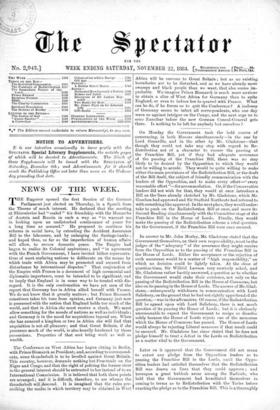In answer to Mr. John Morley, Mr. Gladstone stated that
the Government themselves, on their own responsibility, must be the judges of the " adequacy " of the assurance they might receive from the Opposition as to the passing of the Franchise Bill in the House of Lords. Either the acceptance or the rejection of such assurance would be a matter of "high responsibility," on which no decision could be lightly taken. At the close of question-time, Sir Wilfrid Lawson very unwisely asked, and Mr. Gladstone rather hastily answered, a question as to whether the Government would stake their existence, not only on the passing of the Redistribution Bill in the House of Commons, but also on its passing in the House of Lords. The answer of Mr. Glad- stone,—subsequently withdrawn in communication with Lord Salisbury, on the ground that he had not rightly apprehended the question,—was in the affirmative. Of course, if the Redistribution Bill be agreed upon with Lord Salisbury, there is not much question of its passing the House of Lords ; but it is obviously unreasonable to expect the Government to resign or dissolve solely because the House of Lords rejects one of the measures which the House of Commons has passed. The House of Lords would always be rejecting Liberal measures if that result could be ensured. Mr. Gladstone has since stated that he does not pledge himself to treat a defeat in the Lords on Redistribution as a matter vital to the Government.


































